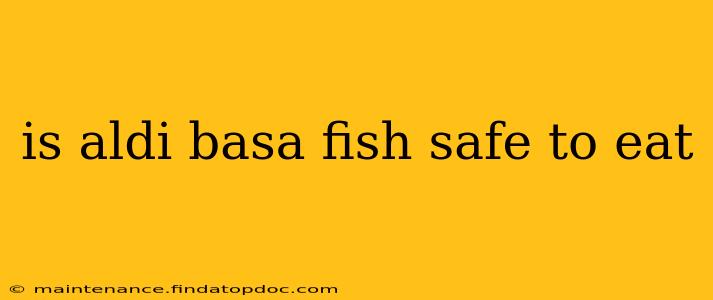The question of whether Aldi's basa fish is safe to eat is a common one, fueled by concerns surrounding the sourcing and farming practices of this popular white fish. Let's delve into the details to provide a comprehensive and informed answer.
What is Basa Fish?
Basa, also known as Pangasius, is a white, flaky fish primarily farmed in Vietnam. Its mild flavor and affordability have made it a popular choice in supermarkets like Aldi. However, its popularity also means we need to carefully examine its safety and sustainability.
Is Basa Fish from Aldi Safe to Eat?
Generally, basa fish sold at Aldi, and other reputable supermarkets, is considered safe to eat when properly handled and cooked. The safety concerns primarily relate to farming practices and potential contaminants, not inherent dangers in the fish itself. However, responsible sourcing and rigorous food safety standards are crucial.
Where is Aldi's Basa Fish Sourced From?
Aldi, like many retailers, doesn't typically disclose the exact farm origins of its basa fish on its product packaging. Their sourcing policies emphasize adherence to food safety regulations and quality standards. To find more specific sourcing information, you'd likely need to contact Aldi customer service directly.
What are the Potential Risks Associated with Basa Fish?
Several concerns are associated with basa fish, most stemming from farming practices in some parts of Vietnam:
-
Antibiotics and Chemicals: Some Vietnamese basa farms have been criticized for using excessive antibiotics and chemicals. These can potentially remain in the fish if not properly managed. Reputable retailers like Aldi generally work with suppliers committed to reducing or eliminating such practices.
-
Environmental Concerns: Intensive basa farming can have negative environmental impacts, such as water pollution and habitat destruction. This is a broader sustainability concern rather than a direct food safety issue.
-
Parasites and Bacteria: Like any seafood, basa can carry parasites or bacteria if not handled correctly during processing and transport. Proper cooking kills these potential contaminants.
How Can I Reduce Risks When Eating Basa Fish?
Several steps can mitigate potential risks:
-
Choose reputable brands: Buying from established supermarkets like Aldi usually indicates adherence to certain food safety standards.
-
Thoroughly cook the fish: Cooking basa to an internal temperature of 145°F (63°C) ensures any harmful bacteria or parasites are eliminated.
-
Check for quality: Examine the fish for any unusual odors or discoloration before purchasing.
-
Be mindful of portion size: While basa is generally safe, moderation is key for a balanced diet.
Is Basa Fish a Healthy Choice?
Basa is a relatively lean source of protein and relatively low in fat. However, its nutritional profile isn't exceptionally remarkable compared to other fish. It's important to incorporate a variety of seafood into your diet for optimal nutrition.
What are the Best Ways to Prepare Aldi Basa Fish?
Basa’s mild flavor makes it versatile for many cooking methods: baking, pan-frying, grilling, or even adding to curries. Ensure it’s cooked thoroughly, regardless of the method chosen.
Are There Alternatives to Basa Fish?
Yes, many delicious and sustainable fish alternatives exist. Consider exploring options like cod, tilapia (when sustainably sourced), salmon, or other white fish species. Focus on choosing seafood from sustainable sources, whenever possible.
In conclusion, while concerns exist regarding some basa farming practices, basa fish from reputable retailers like Aldi, when properly handled and cooked, is generally considered safe to eat. However, informed choices, prioritizing sustainable options and responsible consumption practices, remain crucial.
